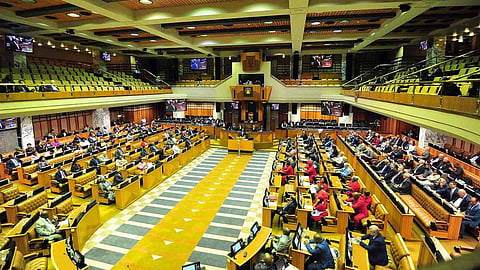Parliament’s paltry performance…kicking the can down the road
OUTA's latest oversight report finds parliament continues to flounder in its responsibilities to hold the executive to account or to properly scrutinise how taxpayers' money is spent or, in many cases wasted. The report titled 'Kicking the can down the road' – the fourth annual report of its kind from OUTA – paints a grim picture of an institution that has not sought to revamp its tattered reputation in the wake of state capture. In his state capture report, Chief Justice Raymond Zondo pointed fingers at parliament for utterly failing in its duties to perform oversight and haul before it those members of the executive who are doing the bidding of the Guptas. BizNews correspondent Michael Appel approached OUTA's Parliamentary Engagement and Research Manager, Rachel Fischer, for some insight into parliament's continued malaise. – Michael Appel
To read OUTA's report on parliament click here.
Excerpts from interviews with OUTA's Rachel Fischer
OUTA's Parliamentary Engagement and Research Manager Rachel Fischer on the general performance of parliament
Put very clearly, not well at all. Over the past four years we've been hoping to see an increase [in performance], more effort. Let us not forget about state capture and the Zondo recommendations. That is something that should function as inspiration. Alas, no.
On whether parliament's performance is improving, declining or stagnating
The previous reports were all very critical of the failure by parliamentarians to hold the executive to account. So even though MPs do say that they are critical and they are trying to work against the constant erosion of state institutions, we do not see that evidence. It's actually quite sad to say but you could say it would be more optimistic if the performance was stagnant. Then at least it remains on a level it doesn't get better or it doesn't get worse, but it isn't even stagnant. We feel that it is getting worse. That is why our report is called "kicking the can down the road". It seems there are these regular or constant delays to actually be forceful [in holding the executive to account]. These delays just lead to the erosion of states infrastructure, roads, water. I see we are even getting water shedding now. So clearly we're going backwards.
On MPs implicated in state capture continuing to hold positions within parliament
How is it possible to take them seriously? We are dealing with members of parliament who have taken an oath of office. So they should put the public before party interests. But since the ANC is the majority party, it goes to reason that in the portfolio committees, the majority of the portfolio committee members represent the majority party. So if there are issues being presented to the portfolio committee and they need to vote on something, chances are that it would go in favour of the majority. So it's not effective. We have been seeing how they still plot or pander to party interests over and above those of the public. This is a problem because essentially you're not serving the public. One thing that we do advocate for in our oversight report is that we want the portfolio chairs to be from the minority parties so that at least there is a position of power that they can wield. We also ask that minority parties submit minority reports on issues that are being raised, because then at least we see a different perspective in what is happening. We cannot say that all MPs are failing within their oversight roles, but unfortunately, their voices are being drowned out by those that are in the majority.
On whether parliament will be effective in implementing Ramaphosa's recommendations following state capture reports
We are doing this work as a civil society organisation. If we weren't invested in the future of South Africa, we probably all would have run away. Let's say that we are optimistic that there are options for change. But Parliament wasn't mandated to wait for the President and his instructions and his own recommendations before addressing the Zondo recommendations. They could have started right off the bat to start effecting change and putting mechanisms in place but they haven't. We've had engagements or feedback where they were saying they can't do anything, that they need to wait and hear what the president says and what his findings are. No, they don't. Parliament is there to oversee the executive. There is a reason why Parliament is there to be a balance to the powers of state organs, but also to have a separation of powers. They could have taken this and been proactive. So I am worried in the sense if this opportunity was missed to be proactive, to be visible, that when it comes to that point, it's going to be lacklustre.
Read also:

